An Essay on the Changes in Student Sleeping Habits During COVID-19
VerifiedAdded on 2022/09/26
|9
|1941
|21
Essay
AI Summary
This essay delves into the significant alterations in student sleeping habits during the COVID-19 pandemic. It highlights how factors such as online classes, increased technology use, and anxieties related to the pandemic have disrupted sleep patterns. The essay explores the importance of sleep for overall health, academic performance, and mental well-being, emphasizing the negative impacts of sleep deprivation on students. It discusses the challenges of irregular schedules, insomnia, and the role of lifestyle changes, including exercise and mindfulness, in improving sleep quality. The essay concludes by offering suggestions for managing stress, reducing reliance on technology, and establishing healthy sleep routines to mitigate the adverse effects of the pandemic on students' sleep and overall wellness. The essay provides valuable insights into the relationship between sleep, academic success, and mental health in the context of the COVID-19 crisis.
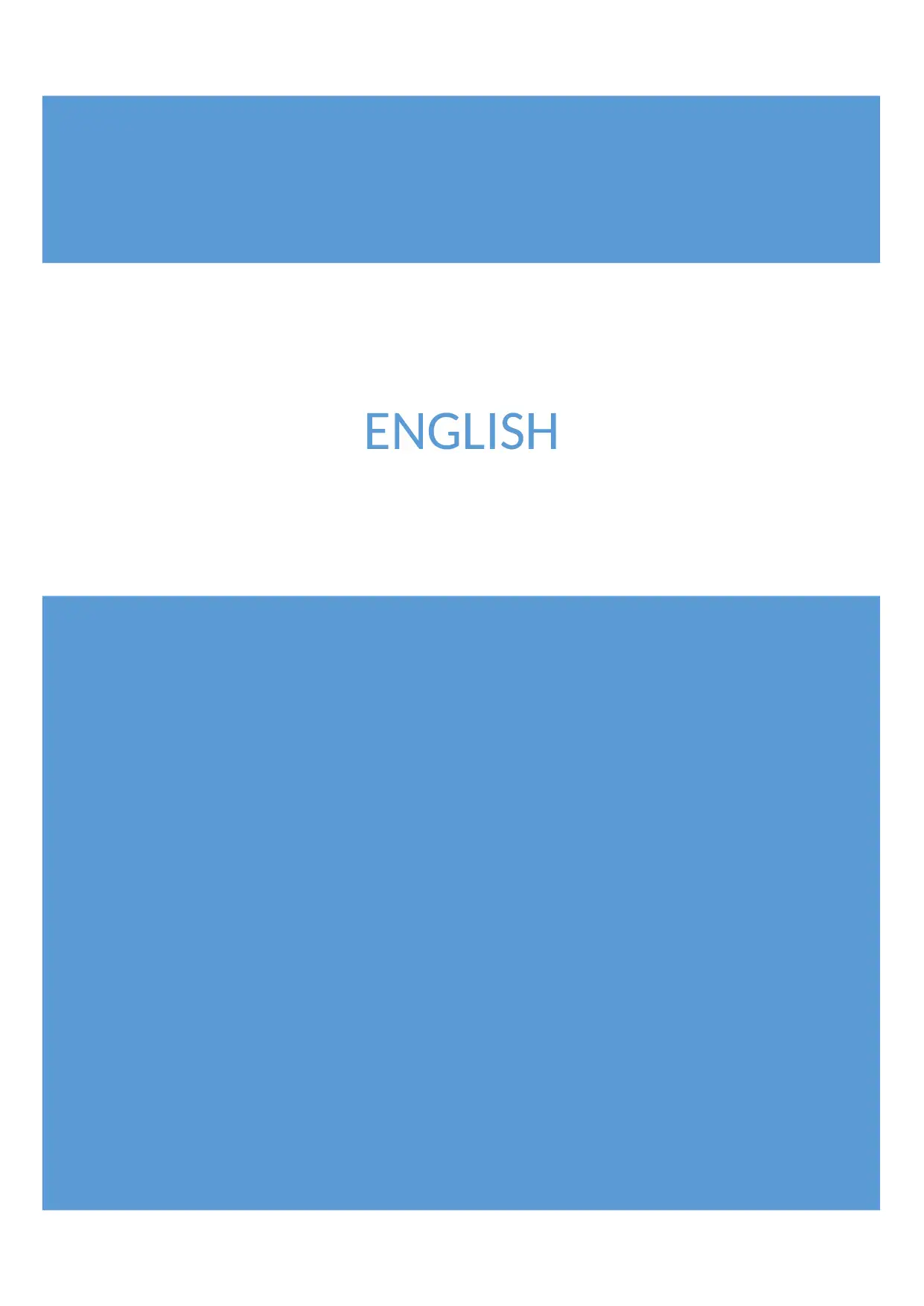
ENGLISH
Paraphrase This Document
Need a fresh take? Get an instant paraphrase of this document with our AI Paraphraser
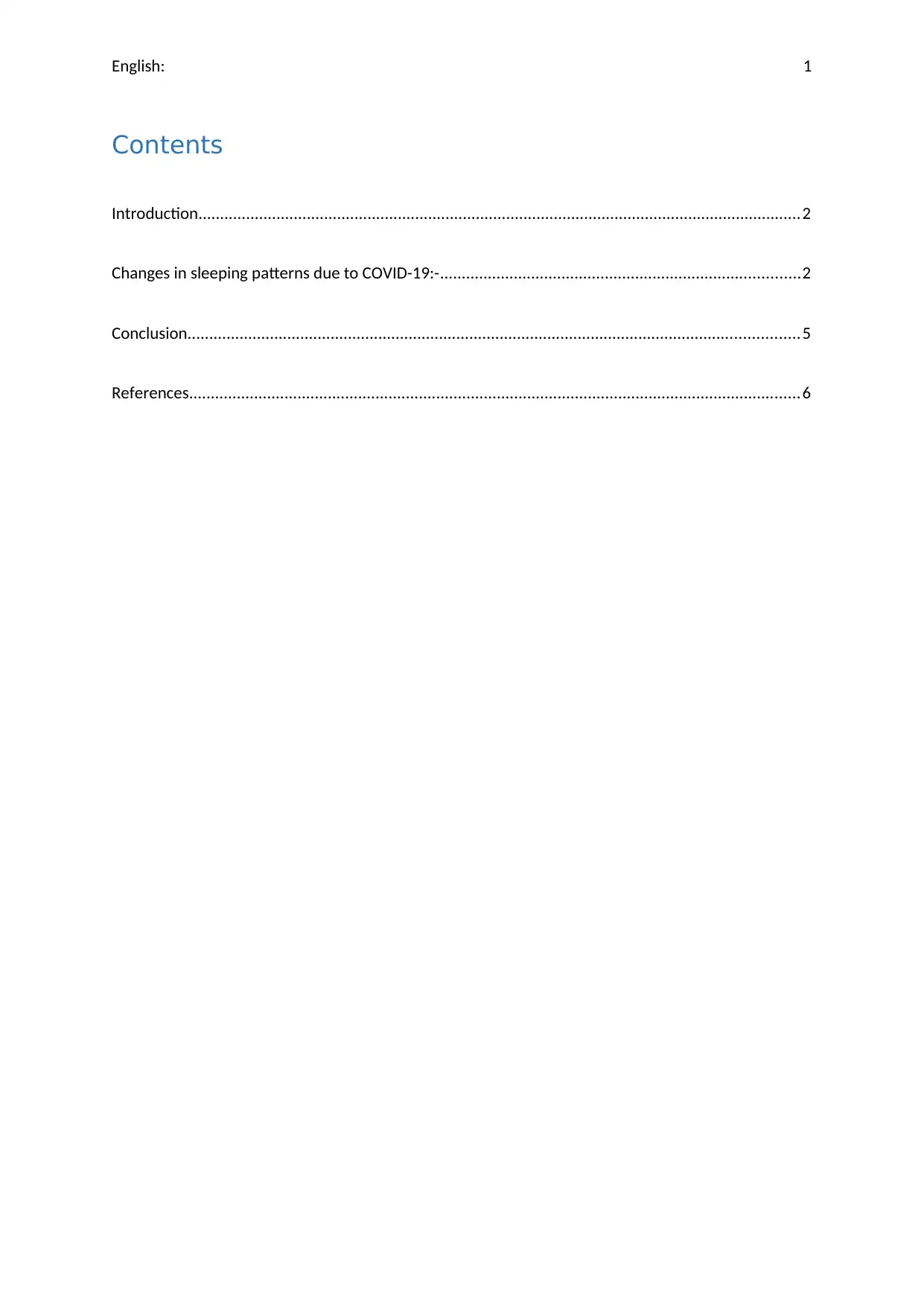
English: 1
Contents
Introduction...........................................................................................................................................2
Changes in sleeping patterns due to COVID-19:-...................................................................................2
Conclusion.............................................................................................................................................5
References.............................................................................................................................................6
Contents
Introduction...........................................................................................................................................2
Changes in sleeping patterns due to COVID-19:-...................................................................................2
Conclusion.............................................................................................................................................5
References.............................................................................................................................................6
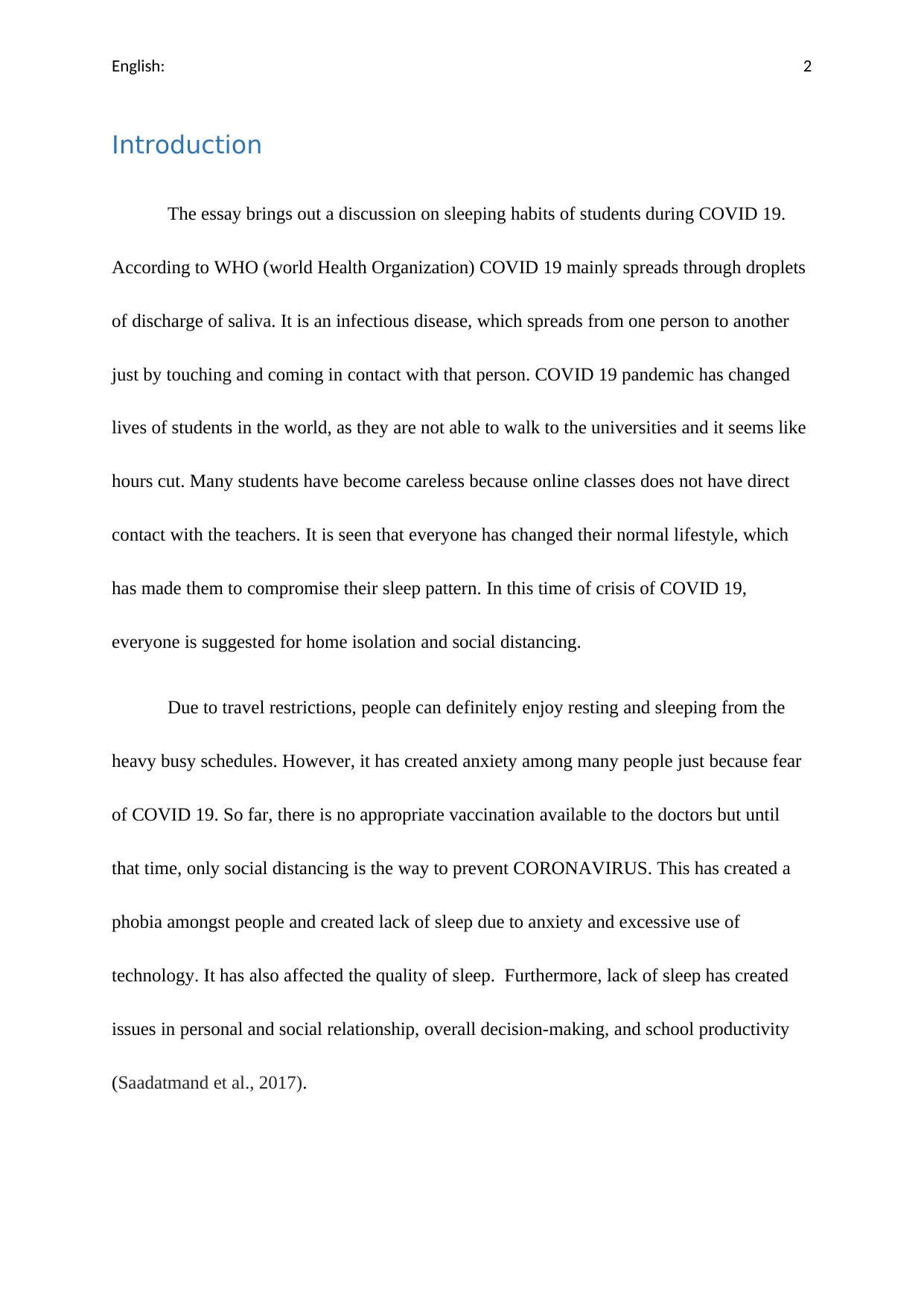
English: 2
Introduction
The essay brings out a discussion on sleeping habits of students during COVID 19.
According to WHO (world Health Organization) COVID 19 mainly spreads through droplets
of discharge of saliva. It is an infectious disease, which spreads from one person to another
just by touching and coming in contact with that person. COVID 19 pandemic has changed
lives of students in the world, as they are not able to walk to the universities and it seems like
hours cut. Many students have become careless because online classes does not have direct
contact with the teachers. It is seen that everyone has changed their normal lifestyle, which
has made them to compromise their sleep pattern. In this time of crisis of COVID 19,
everyone is suggested for home isolation and social distancing.
Due to travel restrictions, people can definitely enjoy resting and sleeping from the
heavy busy schedules. However, it has created anxiety among many people just because fear
of COVID 19. So far, there is no appropriate vaccination available to the doctors but until
that time, only social distancing is the way to prevent CORONAVIRUS. This has created a
phobia amongst people and created lack of sleep due to anxiety and excessive use of
technology. It has also affected the quality of sleep. Furthermore, lack of sleep has created
issues in personal and social relationship, overall decision-making, and school productivity
(Saadatmand et al., 2017).
Introduction
The essay brings out a discussion on sleeping habits of students during COVID 19.
According to WHO (world Health Organization) COVID 19 mainly spreads through droplets
of discharge of saliva. It is an infectious disease, which spreads from one person to another
just by touching and coming in contact with that person. COVID 19 pandemic has changed
lives of students in the world, as they are not able to walk to the universities and it seems like
hours cut. Many students have become careless because online classes does not have direct
contact with the teachers. It is seen that everyone has changed their normal lifestyle, which
has made them to compromise their sleep pattern. In this time of crisis of COVID 19,
everyone is suggested for home isolation and social distancing.
Due to travel restrictions, people can definitely enjoy resting and sleeping from the
heavy busy schedules. However, it has created anxiety among many people just because fear
of COVID 19. So far, there is no appropriate vaccination available to the doctors but until
that time, only social distancing is the way to prevent CORONAVIRUS. This has created a
phobia amongst people and created lack of sleep due to anxiety and excessive use of
technology. It has also affected the quality of sleep. Furthermore, lack of sleep has created
issues in personal and social relationship, overall decision-making, and school productivity
(Saadatmand et al., 2017).
⊘ This is a preview!⊘
Do you want full access?
Subscribe today to unlock all pages.

Trusted by 1+ million students worldwide
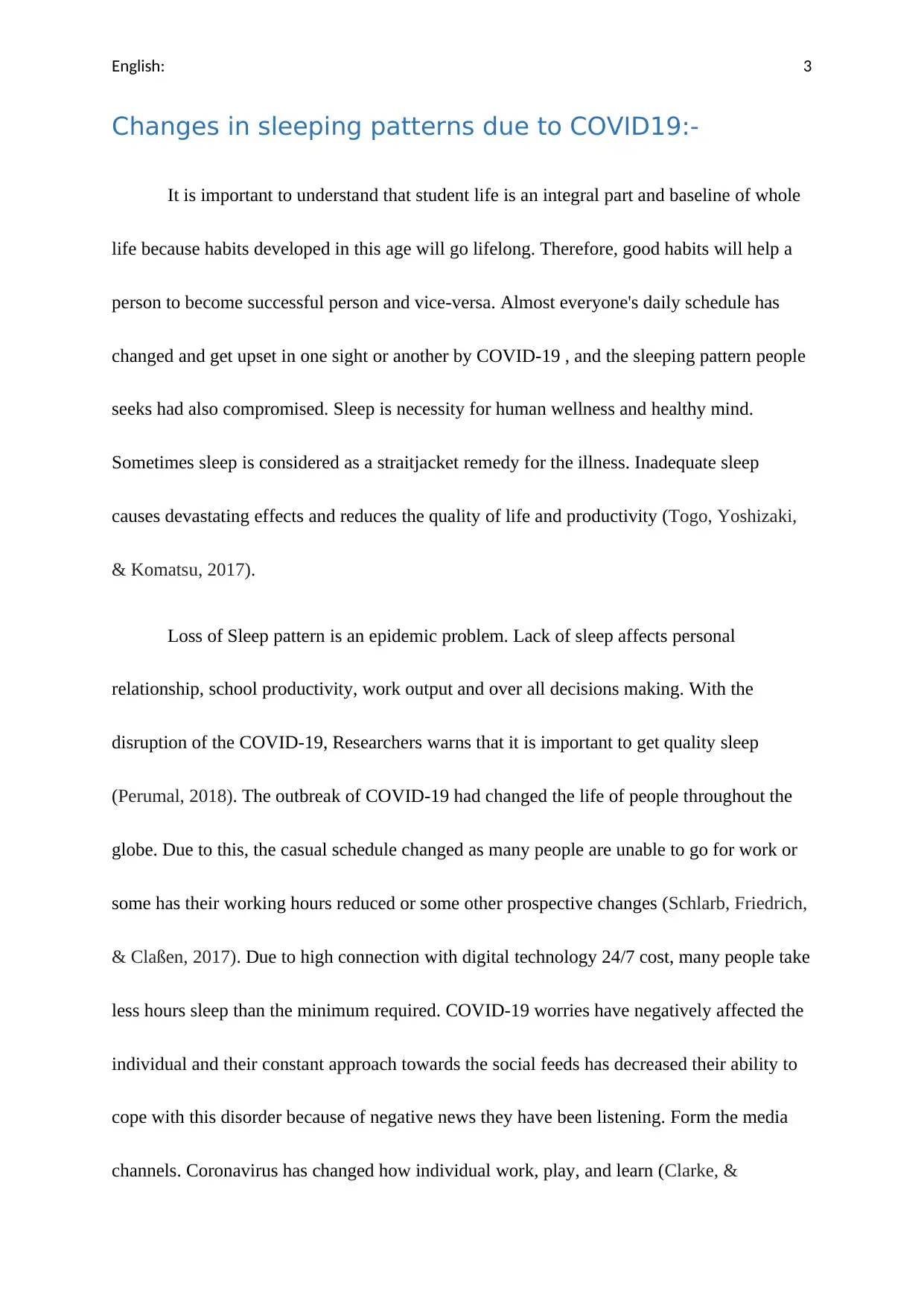
English: 3
Changes in sleeping patterns due to COVID19:-
It is important to understand that student life is an integral part and baseline of whole
life because habits developed in this age will go lifelong. Therefore, good habits will help a
person to become successful person and vice-versa. Almost everyone's daily schedule has
changed and get upset in one sight or another by COVID-19 , and the sleeping pattern people
seeks had also compromised. Sleep is necessity for human wellness and healthy mind.
Sometimes sleep is considered as a straitjacket remedy for the illness. Inadequate sleep
causes devastating effects and reduces the quality of life and productivity (Togo, Yoshizaki,
& Komatsu, 2017).
Loss of Sleep pattern is an epidemic problem. Lack of sleep affects personal
relationship, school productivity, work output and over all decisions making. With the
disruption of the COVID-19, Researchers warns that it is important to get quality sleep
(Perumal, 2018). The outbreak of COVID-19 had changed the life of people throughout the
globe. Due to this, the casual schedule changed as many people are unable to go for work or
some has their working hours reduced or some other prospective changes (Schlarb, Friedrich,
& Claßen, 2017). Due to high connection with digital technology 24/7 cost, many people take
less hours sleep than the minimum required. COVID-19 worries have negatively affected the
individual and their constant approach towards the social feeds has decreased their ability to
cope with this disorder because of negative news they have been listening. Form the media
channels. Coronavirus has changed how individual work, play, and learn (Clarke, &
Changes in sleeping patterns due to COVID19:-
It is important to understand that student life is an integral part and baseline of whole
life because habits developed in this age will go lifelong. Therefore, good habits will help a
person to become successful person and vice-versa. Almost everyone's daily schedule has
changed and get upset in one sight or another by COVID-19 , and the sleeping pattern people
seeks had also compromised. Sleep is necessity for human wellness and healthy mind.
Sometimes sleep is considered as a straitjacket remedy for the illness. Inadequate sleep
causes devastating effects and reduces the quality of life and productivity (Togo, Yoshizaki,
& Komatsu, 2017).
Loss of Sleep pattern is an epidemic problem. Lack of sleep affects personal
relationship, school productivity, work output and over all decisions making. With the
disruption of the COVID-19, Researchers warns that it is important to get quality sleep
(Perumal, 2018). The outbreak of COVID-19 had changed the life of people throughout the
globe. Due to this, the casual schedule changed as many people are unable to go for work or
some has their working hours reduced or some other prospective changes (Schlarb, Friedrich,
& Claßen, 2017). Due to high connection with digital technology 24/7 cost, many people take
less hours sleep than the minimum required. COVID-19 worries have negatively affected the
individual and their constant approach towards the social feeds has decreased their ability to
cope with this disorder because of negative news they have been listening. Form the media
channels. Coronavirus has changed how individual work, play, and learn (Clarke, &
Paraphrase This Document
Need a fresh take? Get an instant paraphrase of this document with our AI Paraphraser
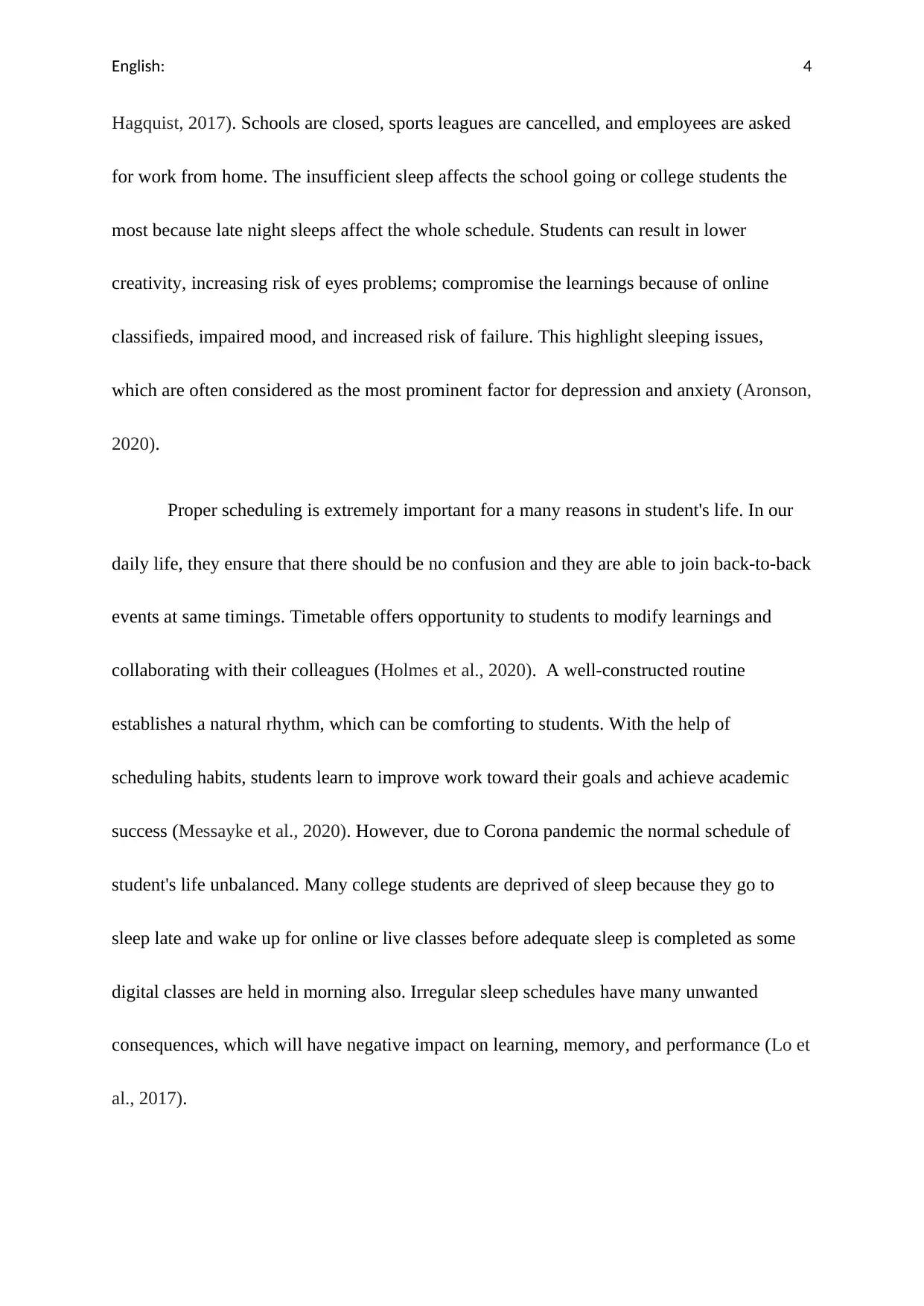
English: 4
Hagquist, 2017). Schools are closed, sports leagues are cancelled, and employees are asked
for work from home. The insufficient sleep affects the school going or college students the
most because late night sleeps affect the whole schedule. Students can result in lower
creativity, increasing risk of eyes problems; compromise the learnings because of online
classifieds, impaired mood, and increased risk of failure. This highlight sleeping issues,
which are often considered as the most prominent factor for depression and anxiety (Aronson,
2020).
Proper scheduling is extremely important for a many reasons in student's life. In our
daily life, they ensure that there should be no confusion and they are able to join back-to-back
events at same timings. Timetable offers opportunity to students to modify learnings and
collaborating with their colleagues (Holmes et al., 2020). A well-constructed routine
establishes a natural rhythm, which can be comforting to students. With the help of
scheduling habits, students learn to improve work toward their goals and achieve academic
success (Messayke et al., 2020). However, due to Corona pandemic the normal schedule of
student's life unbalanced. Many college students are deprived of sleep because they go to
sleep late and wake up for online or live classes before adequate sleep is completed as some
digital classes are held in morning also. Irregular sleep schedules have many unwanted
consequences, which will have negative impact on learning, memory, and performance (Lo et
al., 2017).
Hagquist, 2017). Schools are closed, sports leagues are cancelled, and employees are asked
for work from home. The insufficient sleep affects the school going or college students the
most because late night sleeps affect the whole schedule. Students can result in lower
creativity, increasing risk of eyes problems; compromise the learnings because of online
classifieds, impaired mood, and increased risk of failure. This highlight sleeping issues,
which are often considered as the most prominent factor for depression and anxiety (Aronson,
2020).
Proper scheduling is extremely important for a many reasons in student's life. In our
daily life, they ensure that there should be no confusion and they are able to join back-to-back
events at same timings. Timetable offers opportunity to students to modify learnings and
collaborating with their colleagues (Holmes et al., 2020). A well-constructed routine
establishes a natural rhythm, which can be comforting to students. With the help of
scheduling habits, students learn to improve work toward their goals and achieve academic
success (Messayke et al., 2020). However, due to Corona pandemic the normal schedule of
student's life unbalanced. Many college students are deprived of sleep because they go to
sleep late and wake up for online or live classes before adequate sleep is completed as some
digital classes are held in morning also. Irregular sleep schedules have many unwanted
consequences, which will have negative impact on learning, memory, and performance (Lo et
al., 2017).

English: 5
In fact, we have to learn that sleep is not a choice it is an obligation. They used to
sleep in daytime, which causes improper sleep at night. As we recharge our smartphone, our
brain is better than a smartphone so it is important to recharge our brain regularly for better
performance. We should ignore technology and just have a good sleep, will help the body
feel fresh. However, students were not having a proper sleep, as they are insomniac (Huang,
2020).
Due to lockdown, every teenager has been stay at home, whole day, and they used to
lay down on bed for whole time and become extremely lethargic. Their routine has been
distracted, which has become one of main cause of dissatisfaction and lack of concentration
power. There will be wastage of abilities, which every student seeks (Coyne et al., 2020).
Because of laziness the sports player will become unproductive. They will lose their
potential. Moreover, when the schools and colleges will reopen they will not able to cope up
with harsh conditions. They will not able to complete their work on time (Vernon, Modecki,
& Barber, 2018). During lockdown a student should have proper sleep to save their energy
mode and could do hard work for the online classes at least during the lockdown. Everyone
should do regular exercise, which will not only improve immune system but also will
increase energy level and can help to decrease stress level and also improve sleep quality
(Aronson, 2020).
Many researchers have motivated by making simple poster and test strategies to protect them
during sleep from the negative energies they come across. There are many resolutions to
In fact, we have to learn that sleep is not a choice it is an obligation. They used to
sleep in daytime, which causes improper sleep at night. As we recharge our smartphone, our
brain is better than a smartphone so it is important to recharge our brain regularly for better
performance. We should ignore technology and just have a good sleep, will help the body
feel fresh. However, students were not having a proper sleep, as they are insomniac (Huang,
2020).
Due to lockdown, every teenager has been stay at home, whole day, and they used to
lay down on bed for whole time and become extremely lethargic. Their routine has been
distracted, which has become one of main cause of dissatisfaction and lack of concentration
power. There will be wastage of abilities, which every student seeks (Coyne et al., 2020).
Because of laziness the sports player will become unproductive. They will lose their
potential. Moreover, when the schools and colleges will reopen they will not able to cope up
with harsh conditions. They will not able to complete their work on time (Vernon, Modecki,
& Barber, 2018). During lockdown a student should have proper sleep to save their energy
mode and could do hard work for the online classes at least during the lockdown. Everyone
should do regular exercise, which will not only improve immune system but also will
increase energy level and can help to decrease stress level and also improve sleep quality
(Aronson, 2020).
Many researchers have motivated by making simple poster and test strategies to protect them
during sleep from the negative energies they come across. There are many resolutions to
⊘ This is a preview!⊘
Do you want full access?
Subscribe today to unlock all pages.

Trusted by 1+ million students worldwide
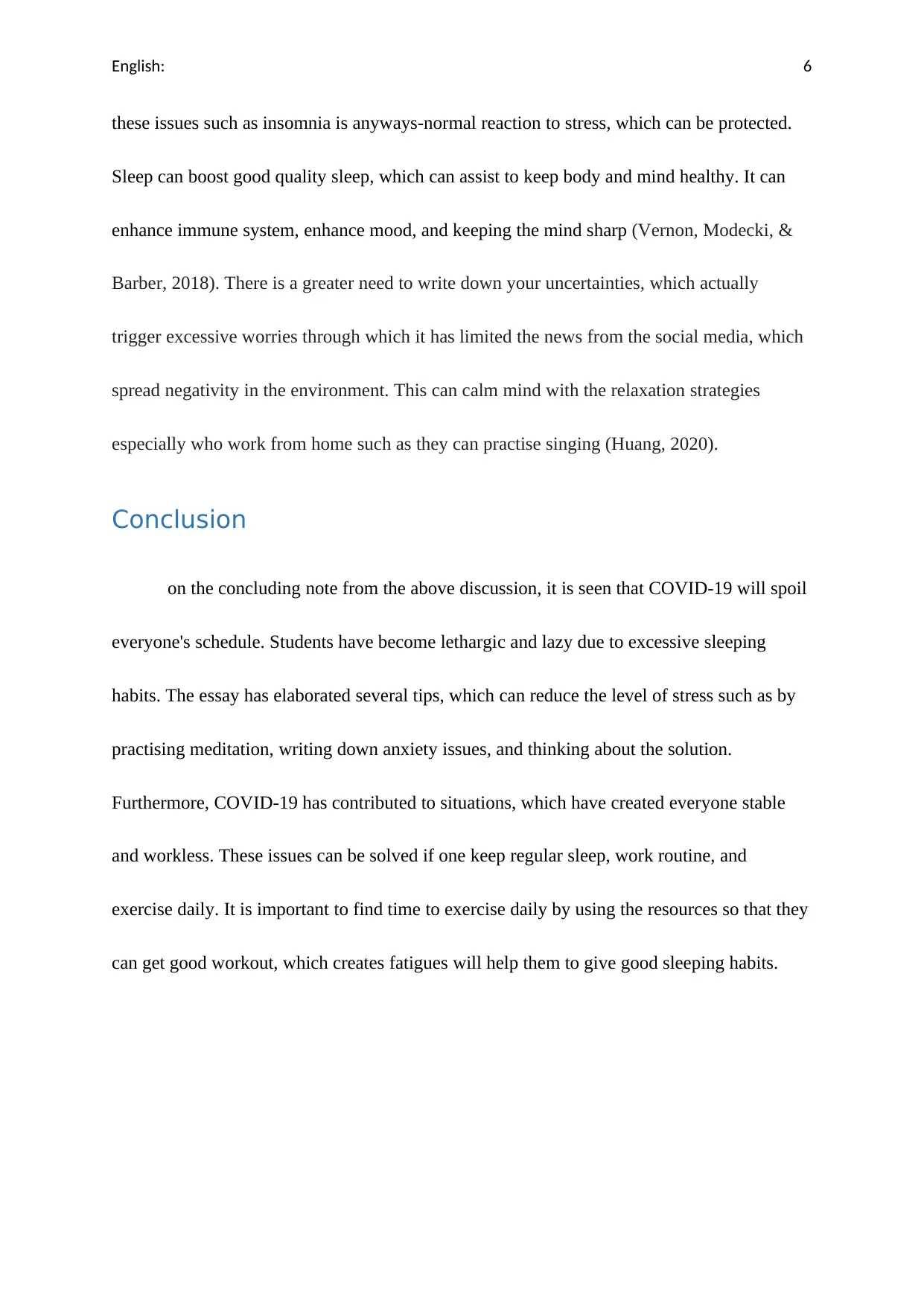
English: 6
these issues such as insomnia is anyways-normal reaction to stress, which can be protected.
Sleep can boost good quality sleep, which can assist to keep body and mind healthy. It can
enhance immune system, enhance mood, and keeping the mind sharp (Vernon, Modecki, &
Barber, 2018). There is a greater need to write down your uncertainties, which actually
trigger excessive worries through which it has limited the news from the social media, which
spread negativity in the environment. This can calm mind with the relaxation strategies
especially who work from home such as they can practise singing (Huang, 2020).
Conclusion
on the concluding note from the above discussion, it is seen that COVID-19 will spoil
everyone's schedule. Students have become lethargic and lazy due to excessive sleeping
habits. The essay has elaborated several tips, which can reduce the level of stress such as by
practising meditation, writing down anxiety issues, and thinking about the solution.
Furthermore, COVID-19 has contributed to situations, which have created everyone stable
and workless. These issues can be solved if one keep regular sleep, work routine, and
exercise daily. It is important to find time to exercise daily by using the resources so that they
can get good workout, which creates fatigues will help them to give good sleeping habits.
these issues such as insomnia is anyways-normal reaction to stress, which can be protected.
Sleep can boost good quality sleep, which can assist to keep body and mind healthy. It can
enhance immune system, enhance mood, and keeping the mind sharp (Vernon, Modecki, &
Barber, 2018). There is a greater need to write down your uncertainties, which actually
trigger excessive worries through which it has limited the news from the social media, which
spread negativity in the environment. This can calm mind with the relaxation strategies
especially who work from home such as they can practise singing (Huang, 2020).
Conclusion
on the concluding note from the above discussion, it is seen that COVID-19 will spoil
everyone's schedule. Students have become lethargic and lazy due to excessive sleeping
habits. The essay has elaborated several tips, which can reduce the level of stress such as by
practising meditation, writing down anxiety issues, and thinking about the solution.
Furthermore, COVID-19 has contributed to situations, which have created everyone stable
and workless. These issues can be solved if one keep regular sleep, work routine, and
exercise daily. It is important to find time to exercise daily by using the resources so that they
can get good workout, which creates fatigues will help them to give good sleeping habits.
Paraphrase This Document
Need a fresh take? Get an instant paraphrase of this document with our AI Paraphraser
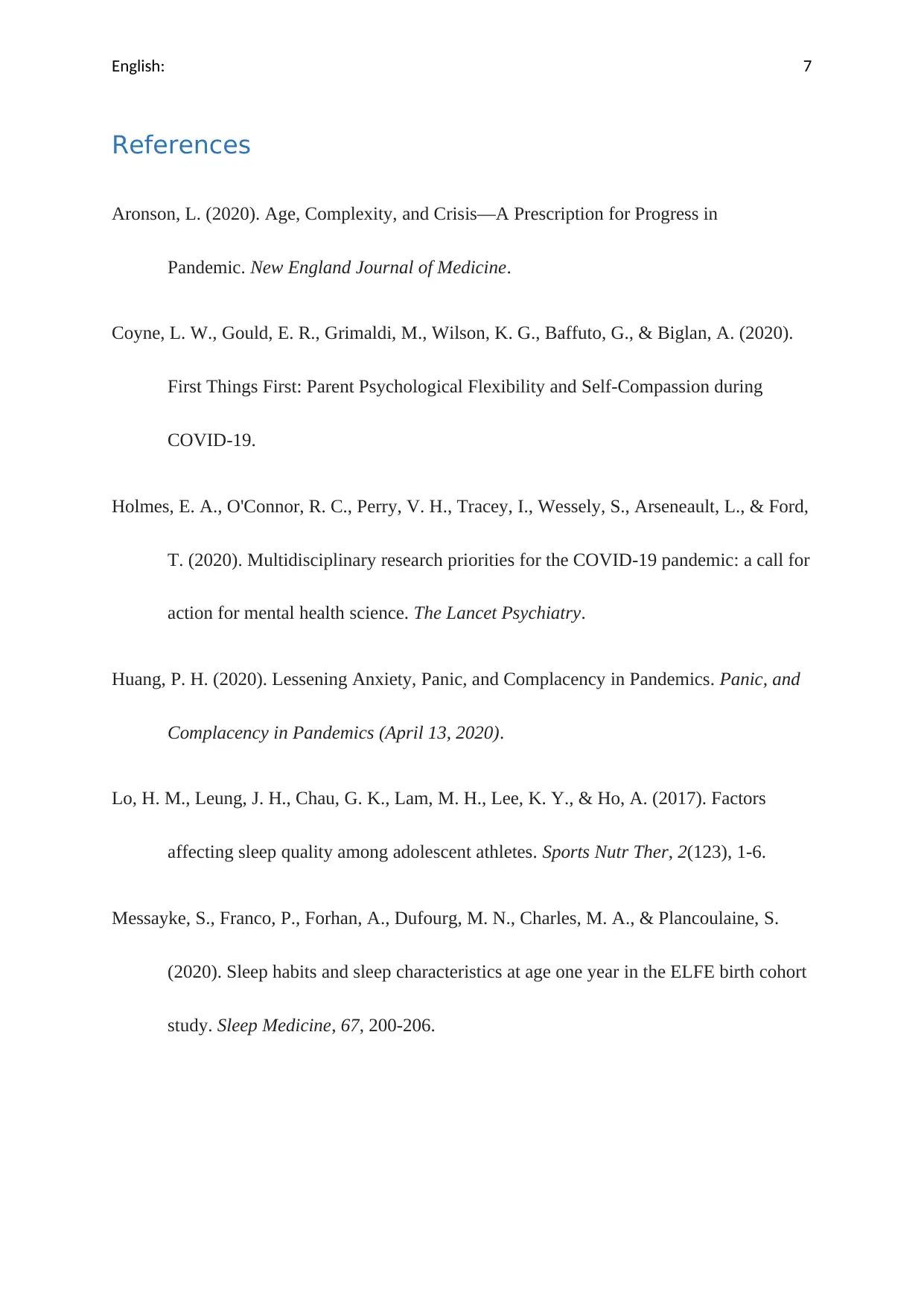
English: 7
References
Aronson, L. (2020). Age, Complexity, and Crisis—A Prescription for Progress in
Pandemic. New England Journal of Medicine.
Coyne, L. W., Gould, E. R., Grimaldi, M., Wilson, K. G., Baffuto, G., & Biglan, A. (2020).
First Things First: Parent Psychological Flexibility and Self-Compassion during
COVID-19.
Holmes, E. A., O'Connor, R. C., Perry, V. H., Tracey, I., Wessely, S., Arseneault, L., & Ford,
T. (2020). Multidisciplinary research priorities for the COVID-19 pandemic: a call for
action for mental health science. The Lancet Psychiatry.
Huang, P. H. (2020). Lessening Anxiety, Panic, and Complacency in Pandemics. Panic, and
Complacency in Pandemics (April 13, 2020).
Lo, H. M., Leung, J. H., Chau, G. K., Lam, M. H., Lee, K. Y., & Ho, A. (2017). Factors
affecting sleep quality among adolescent athletes. Sports Nutr Ther, 2(123), 1-6.
Messayke, S., Franco, P., Forhan, A., Dufourg, M. N., Charles, M. A., & Plancoulaine, S.
(2020). Sleep habits and sleep characteristics at age one year in the ELFE birth cohort
study. Sleep Medicine, 67, 200-206.
References
Aronson, L. (2020). Age, Complexity, and Crisis—A Prescription for Progress in
Pandemic. New England Journal of Medicine.
Coyne, L. W., Gould, E. R., Grimaldi, M., Wilson, K. G., Baffuto, G., & Biglan, A. (2020).
First Things First: Parent Psychological Flexibility and Self-Compassion during
COVID-19.
Holmes, E. A., O'Connor, R. C., Perry, V. H., Tracey, I., Wessely, S., Arseneault, L., & Ford,
T. (2020). Multidisciplinary research priorities for the COVID-19 pandemic: a call for
action for mental health science. The Lancet Psychiatry.
Huang, P. H. (2020). Lessening Anxiety, Panic, and Complacency in Pandemics. Panic, and
Complacency in Pandemics (April 13, 2020).
Lo, H. M., Leung, J. H., Chau, G. K., Lam, M. H., Lee, K. Y., & Ho, A. (2017). Factors
affecting sleep quality among adolescent athletes. Sports Nutr Ther, 2(123), 1-6.
Messayke, S., Franco, P., Forhan, A., Dufourg, M. N., Charles, M. A., & Plancoulaine, S.
(2020). Sleep habits and sleep characteristics at age one year in the ELFE birth cohort
study. Sleep Medicine, 67, 200-206.
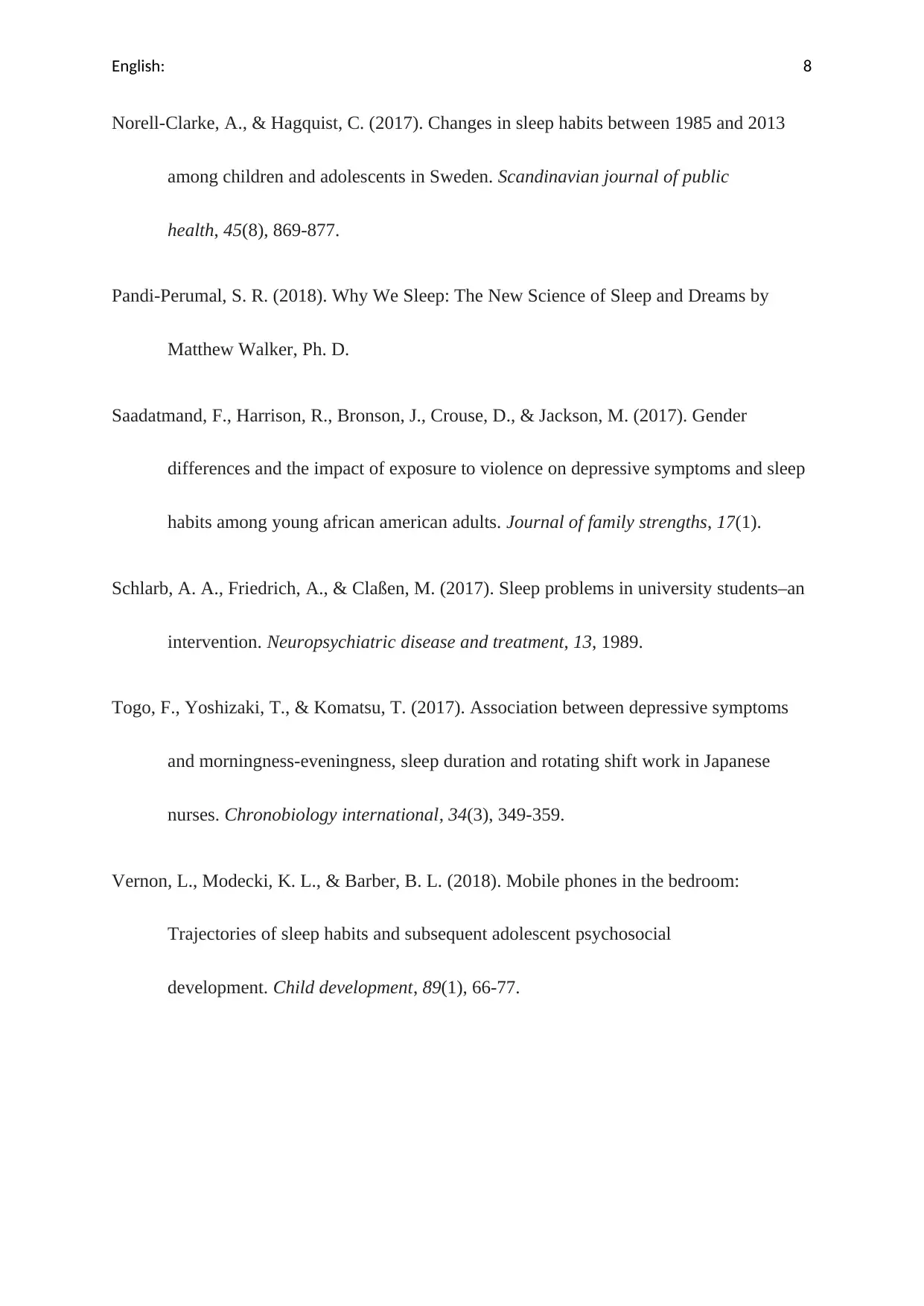
English: 8
Norell-Clarke, A., & Hagquist, C. (2017). Changes in sleep habits between 1985 and 2013
among children and adolescents in Sweden. Scandinavian journal of public
health, 45(8), 869-877.
Pandi-Perumal, S. R. (2018). Why We Sleep: The New Science of Sleep and Dreams by
Matthew Walker, Ph. D.
Saadatmand, F., Harrison, R., Bronson, J., Crouse, D., & Jackson, M. (2017). Gender
differences and the impact of exposure to violence on depressive symptoms and sleep
habits among young african american adults. Journal of family strengths, 17(1).
Schlarb, A. A., Friedrich, A., & Claßen, M. (2017). Sleep problems in university students–an
intervention. Neuropsychiatric disease and treatment, 13, 1989.
Togo, F., Yoshizaki, T., & Komatsu, T. (2017). Association between depressive symptoms
and morningness-eveningness, sleep duration and rotating shift work in Japanese
nurses. Chronobiology international, 34(3), 349-359.
Vernon, L., Modecki, K. L., & Barber, B. L. (2018). Mobile phones in the bedroom:
Trajectories of sleep habits and subsequent adolescent psychosocial
development. Child development, 89(1), 66-77.
Norell-Clarke, A., & Hagquist, C. (2017). Changes in sleep habits between 1985 and 2013
among children and adolescents in Sweden. Scandinavian journal of public
health, 45(8), 869-877.
Pandi-Perumal, S. R. (2018). Why We Sleep: The New Science of Sleep and Dreams by
Matthew Walker, Ph. D.
Saadatmand, F., Harrison, R., Bronson, J., Crouse, D., & Jackson, M. (2017). Gender
differences and the impact of exposure to violence on depressive symptoms and sleep
habits among young african american adults. Journal of family strengths, 17(1).
Schlarb, A. A., Friedrich, A., & Claßen, M. (2017). Sleep problems in university students–an
intervention. Neuropsychiatric disease and treatment, 13, 1989.
Togo, F., Yoshizaki, T., & Komatsu, T. (2017). Association between depressive symptoms
and morningness-eveningness, sleep duration and rotating shift work in Japanese
nurses. Chronobiology international, 34(3), 349-359.
Vernon, L., Modecki, K. L., & Barber, B. L. (2018). Mobile phones in the bedroom:
Trajectories of sleep habits and subsequent adolescent psychosocial
development. Child development, 89(1), 66-77.
⊘ This is a preview!⊘
Do you want full access?
Subscribe today to unlock all pages.

Trusted by 1+ million students worldwide
1 out of 9
Related Documents
Your All-in-One AI-Powered Toolkit for Academic Success.
+13062052269
info@desklib.com
Available 24*7 on WhatsApp / Email
![[object Object]](/_next/static/media/star-bottom.7253800d.svg)
Unlock your academic potential
Copyright © 2020–2026 A2Z Services. All Rights Reserved. Developed and managed by ZUCOL.





